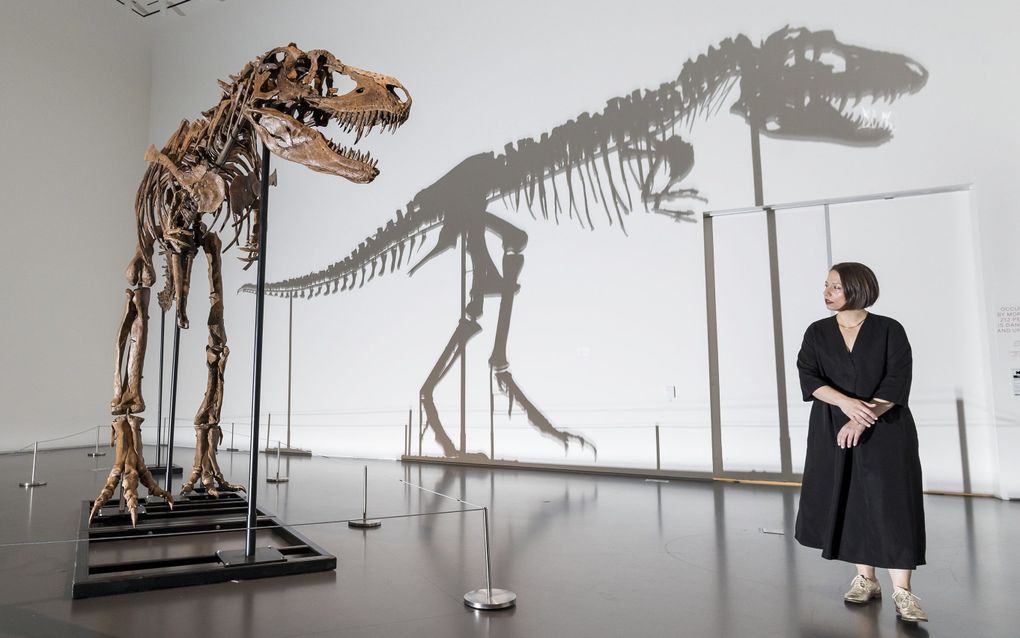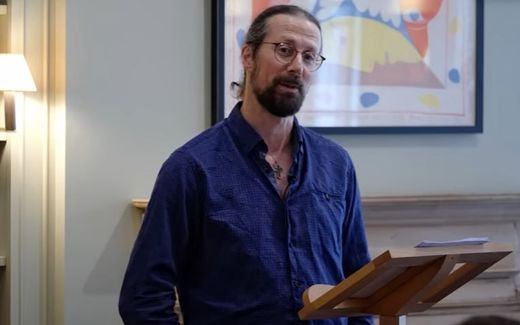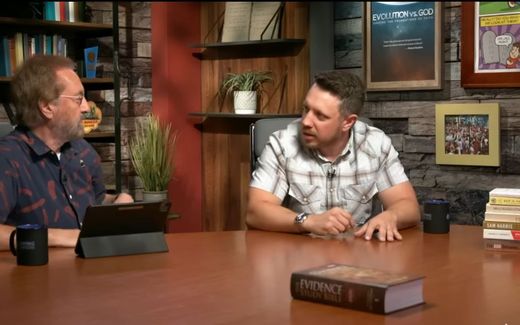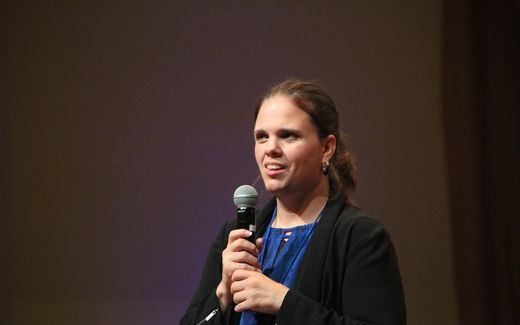Can a top scientist become a creationist? This Swede did

Cassandra Hatton, Sotheby's Global Head of Science and Popular Culture, walks past a full skeleton of a Gorgosaurus dinosaur on display at Sotheby’s auction house. Photo EPA, Justin Lane
Northern Europe
Until a few years ago, the Swedish professor Ola Hössjer believed that God created the Earth through evolution. But then doubts arose and he got even convinced that young earth creationism is true.
Stay up to date with Christian news in Europe? Sign up for CNE's newsletter.
Has not science proved that evolution is true? Well, the majority might say that. But some have second thoughts, also in the world of academia. In his book The Devil’s Delusion (2008), even a non-Christian like David Berlinski showed that scientific observation did not confirm the theory.
CNE spoke recently with the Swedish professor of Mathematical Statistics, Ola Hössjer. He is convinced that young-earth creationism is the most valid option to consider when it comes to the origins of the Earth and life.
Prof. Hössjer, you are a Christian and a professor of Mathematical Statistics who believes that the Earth is no older than about 6,000 years old. Have you always believed that?
“No, it has taken long before I came to this point. I became a Christian in my early twenties. I believed for a long time that God had created everything through evolution. I felt it was all right to integrate modern scientific theories with the Bible. I just didn’t interpret Genesis literally. For me, it was enough to know that God was mighty and powerful.
But then, many brothers in Christ began to ask me what I thought about the origins of the world. Even though I was a scientist, I didn’t know much about the topic. So, I felt I had a responsibility to dig into the question. It took time before I began to do so because I had a full-time job and a family to care for. Eventually, I began to read some creationist material. I was struck to find out that these Christians knew a lot about natural science and also had a very high view of the Bible.
I also realised the criticisms raised against what they said were not scientific but philosophical. They started from the presupposition that science only allowed for natural explanation. For these critics, any supernatural intervention was, therefore, excluded from the start, even before any data were analysed.
It still took time for me to adopt the young-earth creationist view because, as a scientist, I know that I cannot accept any claim without testing it first. But as I began to collect more and more data, I realised that the young-earth creationist view was the most valid option. I, therefore, gradually turned to this view between ten and five years ago.”
What are the top five scientific insights that made you believe in the young-earth creationist view?
“Before I answer that question, I need to say that a question such as one about the origins of the Earth is a historical one which cannot be answered through repeated experiments. You can only compare theories and then look where the data from the past seem to lead you.
But, from science alone, you cannot come to a definitive conclusion. Even if I believe that the young-earth creationist option is the best one, there are still open questions even with that view. As for the top five insights, here they are.
First, many people have actually argued that geology speaks for the millions of years option. For example, the sediments on the rocks are brought as a proof for that. Yet, sediments cannot be formed through millions of years. If that were the case, the fossils of the rocks would have faded away with time, because of the degrading impact of bacteria and so on.
The most valid option for the sediments on the rocks is that they must have come into being through a worldwide catastrophe that rapidly encapsulated plants and animals, i.e. through water rising and fading away quickly. The Bible tells us of such a catastrophe, of course, the flood of Noah.”
Branches
“When we try to rebuild the male genetic tree of humans, through the Y chromosomes, we realise that the branches of the tree merge at a root about 4500 years ago. This corresponds to the lifetime of Noah.
Similarly, the women’s genetic tree, which is distinguishable through mitochondrial DNA, goes back to about 6000 years ago, the era in which Eve would have lived. This is not unexpected because Noah’s three daughters-in-law were also in the ark. Therefore the branches of the female tree have to merge before the time of Noah.
We know that there are many ancient stories of a worldwide flood found all over the world. We also know that most civilisations were born around 4000 years ago; that is after the flood and the Tower of Babel event from the Biblical narrative. And we have ancient stories of dragons all around the world. Their description seems to lead to the conclusion that these creatures were dinosaurs, descendants of animals that survived the flood. The soft tissues and the DNA found from dinosaur fossils seem to indicate that they are much younger than what the evolutionist option tells us.
The evolutionists tell us that we descend from apes. It is true that apes and humans have quite similar DNA. Yet it is used very differently.
Moreover, mankind has language, apes do not. Our ways of walking are different. Many parts of our bodies are quite different, even though apes and humans may look similar at first glance (e.g. feet, skull, etc.).
Furthermore, we still haven’t found the intermediate species needed to validate the evolutionary theory. For example, we know now that the well-known fossil Lucy was an ape.”
Time zero
“A most recent theory arose from the field of bacteriology, which seems to suggest that the Earth had to be created quickly. Bacteria, plants and animals need each other from time zero, in symbiosis, in order to survive. An evolutionist approach does not accommodate that.
Also, the sun could not have been created earlier than what Genesis claims. If it had been so, it would have destroyed any possibility of life on Earth. The environment needed to be very protected by an atmosphere before the sun was created. This is well in line with what Genesis tells us.”
In spite of this, the theory of evolution still seems to be a valid option for many scientists. Are there elements within that theory that prove its invalidity?
“The strongest argument against the evolution theory is that life is extremely complicated. So far, all the secular theories fail to explain how life came about.
Evolution theory cannot explain how life diverged from one unicellular organism. It cannot explain how the development of this one small cell could lead to the enormous diversity among species we see today. It could not have been a random mechanism because that would have eroded information, something that is central to life. This argument not only destroys the evolutionary theory, but it actually supports the young-earth creationist view.”
If it is true that more and more academics are at least having doubts about the evolution theory, then why is this not made more public?
“There is little willingness to question the evolution theory in the academic world. Yes, there are more and more critical voices about it, but they remain rather silent.
The main problem is that science has become more secular since the 19th century. In practice that means, as I said before, that only natural explanations are accepted. And evolution is the only possible theory under that framework.
If we put this theory into question, we are actually challenging the very presuppositions upon which natural science rests today. That would be too much for many people.
There is also the culture. We have been taught that evolution was as sure as the theory of gravity since our childhood. So, the peer pressure is great. Those who silently question the evolution theory don’t dare to speak publicly about it. They fear that if they do, their academic career would be compromised.”
How do Christians react to your belief?
“Christians differ a lot on creation, even among conservatives. Many of them are positive about the young-earth creationist theory. However, because of the overwhelming prevalence of the evolution theory, many still feel that they need to interpret Genesis metaphorically in order to fit in. They believe that science has proven evolution to be true, even if this is not the case.
I don’t believe that the belief we have about creation, whatever it may be, affects whether a person is saved or not. However, I think that evolution does have a devastating effect in the long run because it seriously discredits the validity of the Bible. The discussions about the origins are important, and we need to have them, but we must remember that the most important mission for Christians is to announce the Good News of Jesus Christ to those who don’t believe.”
About Ola Hössjer
Ola Hössjer (60) has been interested in mathematics since the age of 15 already during his university studies. In 2009 he received the Gustafsson prize in mathematics, the most prestigious national scientific prize in Sweden. Currently, he works as a Professor of Mathematical Statistics.
Ola grew up in a Christian environment, but it was not until he was 23-24 years old that he gave his life to Jesus Christ as Lord and Saviour. Ola has a passion for studying the Bible. He regularly gives sermons, Bible studies and lectures on Christianity and science.
In 2018, he published “Becoming a Christian" at Wipf and Stock, and in 2023, he edited the volume “Biblical Creation on Solid Ground”, together with Samuel Lampa, at STH Academic, Uppsala. Ola has two daughters and one son-in-law. He lives in Sollentuna, a suburb north of Stockholm.
This is a good place to talk about a book you have coedited on the topic. Can you tell us more about that?
“In February 2022, the Scandinavian School of Theology (STH, based in Uppsala) organised a creation conference. A number of creationist researchers from various fields of science, including myself, were invited to contribute.
At the end of the conference, the publishing company of STH agreed to publish a book, gathering all our research papers together in cooperation with the publisher Semnos Förlag.
The book is entitled Biblical Creation on Solid Ground: Arguments from Science, Philosophy and Theology (2023). Its purpose is to showcase that the arguments of young-earth creationism are very solid and strong, be it from the fields of science, philosophy or theology.”
Related Articles












